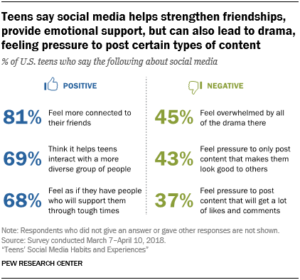Teenagers, it turns out, like social media in part because it helps them feel more connected to friends.
That’s what the Pew Research Center found in a survey about the social media habits and experiences of teens.
From a youth ministry perspective, however, some of those survey results may need to be taken with a grain of salt.
If 81 percent of teens truly feel social media helps deepen relationships with friends, then it’s important to examine how teens define deep relationships, said John Uldrick, the minister of students and missions at First Baptist Church in Rome, Georgia.

John Uldrick
“An adolescent’s view of what relationship looks like might not be the full representation,” he said.
“I wouldn’t want to live with the 16-year-old version of what real relationship looks like.”
Pew researchers also found that 69 percent of teens think social media fosters interactions with more diverse groups of people, and nearly the same percentage said social media connects them with people “who will support them through tough times.”
But Uldrick said another set of Pew statistics reveals that teens have more learning to do about friendship.
Those include the 34 percent who share emotions and feelings on social media, 13 percent who share personal problems and the 11 percent who discuss religious beliefs.
While they may feel close to people in their social media networks, those numbers demonstrate that teens aren’t engage in authentic relationships online.

“That to me is the most telling,” Uldrick said. “Those are things that have depth to them.”
Uldrick said he’s impressed upon members of his youth group that forming true connections with people involves consistent opportunities for physical touch, eye-to-eye engagement, and vulnerability.
If most teens are holding back from talking about their feelings, about their faith and personal problems, they aren’t forming healthy relationships with those people, he said.
And it’s important to distinguish between real and virtual friendships, Uldrick said.
“If I have 1,100 people I am friends with on Facebook, how many of those friends do I really have relationships with?”
Teens also shared with Pew some of their negative attitudes about social media.
Chief among them, at 45 percent, is the level of drama on social media. A similar percentage said they feel pressured to exclusively post content that makes them look good. Also, 37 percent said they post content to generate likes and comments.
Uldrick said he’s covered social media behaviors and attitudes as a formal topic in youth group meetings. One of the negatives he’s drilled into with them is whether ghosting is an acceptable behavior.
Ghosting refers to ending a relationship by cutting off communication with that person, including by ignoring them on social media.
Uldrick said he found that some teens in his youth group believe the practice is acceptable.
“Some said ghosting is fine because you don’t have to have an interchange with them since it’s not a real deep relationship, anyway.”


